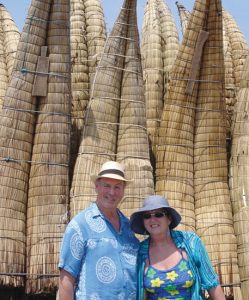There are some Grand Imperatives that govern our working lives. We know we should have our lessons prepared and marking done. We really should attend meetings and upgrade our qualifications. And we really should find time to sleep and stay on speaking terms with the families growing up around us. Then comes retirement and a pension, and suddenly we are should-less and financially free. In this happy state, Beverly and I found ourselves, so we headed straight off to all those fascinating places on the globe we had always meant to visit—and taught school.
For one, we taught English at the Instituto Cultural Peruano Norteamericano in Chiclayo, Peru although everyone called it simply IPNA (ICPNA without the C). The three-month hitch consisted of a series of 18-day rotations with three days off between each session. A weekend on either side of those days off gave a five-day traveling holiday during our working time, and at the end of our contract we planned a solid month of touring. The equipment provided at ICPNA was state-of-the-art so that anyone with an IQ north of conscious could present the lessons, and if you had some actual teacher training, well, that was a bonus for everyone. You were “teacher” to the students who shook your hand and/or kissed you in every greeting and farewell, as did your colleagues and everyone else with whom you had the slightest acquaintance. I don’t know why they left out the C in the acronym because that place had more Culture than I’d seen in a long while.
Besides the astounding scenery, with over fifty mountains in the 5,000+ metre range and many pre-European archeological sites, there are some very personal attractions in Peru. We had carted down a large suitcase of supplies for the organization Canadians Sharing Hope, and were welcomed at the Santa Angela Clinic where we got to know the people who provided services for the poorest citizens of Chiclayo. This clinic, founded by Ursaline nuns from Canada, enlisted professionals and others in community outreach programs. If there was a diagnostic and education day operating in some small community, with lines of moms and toddlers at little adobe buildings, it was probably their work. A day-care providing a least one meal a day and elementary social skills would be one of their projects. Such organizations are usually present wherever there is a need, and here the need was great. We brought them cash and supplies from Canadian donors and they took our hearts as well.
The three elements of our associations in Peru—ICPNA, the land and the clinic—are entwined now in our memories. Colleagues from the school accompanied us on trips as guides, while volunteers at the clinic became our friends and mentors. The three working months went by too quickly, and then we packed up, took our bundle of tickets and vouchers and went traveling.
 All the magical places in Peru from the White Mountains to Kuelap, to Chan Chan, Lake Titicaca and Machu Picchu, we visited. The experiences were breath-taking—sometimes literally so as we acclimatized to high altitudes—and all of the superlatives that you have heard used to describe them are true. There is crime of course and you need to stay alert, but it is not a prohibitive issue. History, emergent aboriginal pride, and archeological wonders can also be experienced. The “shoulds” of your life really should include some time in this country.
All the magical places in Peru from the White Mountains to Kuelap, to Chan Chan, Lake Titicaca and Machu Picchu, we visited. The experiences were breath-taking—sometimes literally so as we acclimatized to high altitudes—and all of the superlatives that you have heard used to describe them are true. There is crime of course and you need to stay alert, but it is not a prohibitive issue. History, emergent aboriginal pride, and archeological wonders can also be experienced. The “shoulds” of your life really should include some time in this country.
You can check out the two English-language ICPNA colleges in Peru, one in the north at Chiclayo, the second-largest city, and one in the south at Arequipa by emailing icpnachi@mail.udep.edu.pe or majid@icpnachi.edu.pe.
ABOUT THE AUTHORS
Beverly Brookman and Derek Peach
Beverly Brookman and Derek Peach, two former Saanich, BC teachers, have written a book about their time in Peru. One Room and a Penknife is available for $20 plus postage by emailing dpeach5@yahoo.com. The profits from book sales go to the clinic of Santa Angela.
This article is from Canadian Teacher Magazine’s January 2009 issue









